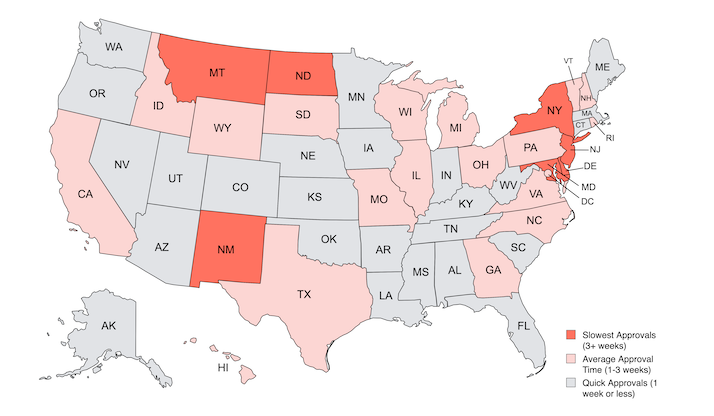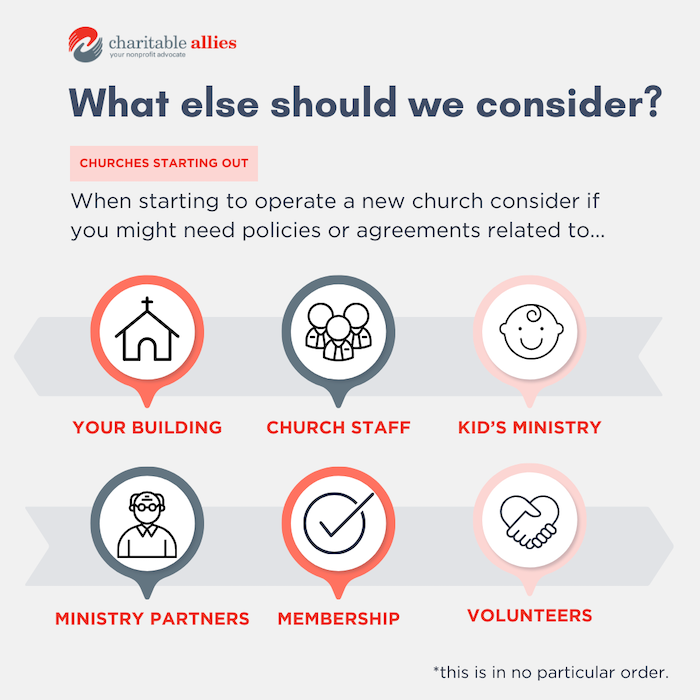
If you’re wondering about how to start a church, you’ve come to the right place. Our legal team outlines the step-by-step process below. We’ve helped hundreds of churches and ministries obtain 501c3 status and thrive, so if you’d like to learn more about getting our help in the process, reach out!
How to Start a Church Step One: Incorporating Your Church
Regardless of whether your church is going to officially file with the IRS for 501c3 status, in order to start a church, you’ll need to incorporate with your state. If you don’t incorporate, you’ll run into a host of issues. Churches that meet the IRS’s definition of a church are automatically tax exempt but only if the organization is also incorporated properly in the state they operate in. Some states call this incorporation document the “Articles of Incorporation,” while others will call it “Certificate of Formation” or something similar. There are three important things of note in this step:
- Make sure your “statement of purpose” (sometimes called purpose language or similar) accurately reflects that the church is being organized for religious purposes. It’s key that the language you use in this document is in-line with language your state authority and the IRS recognize as charitable.
- State waiting times vary wildly. We’ve categorized all 50 states below to give you an idea of their general timeline, but sometimes factors like being short staffed or having more registrations to review will cause longer wait times.
- Every state charges a fee to file the Articles of Incorporation. This can vary from as little as $8 to a few hundred dollars, especially if you opt for an expedited processing.
How long will it take for my Church’s Articles of Incorporation to be Approved?

Waiting times vary. Many states will list how long the wait times are on the website of the governmental body that reviews the documents, which could be a Secretary of State or Division of Corporations. Some states have an extra fee you can pay to further expedite your applications, but not all states offer this option. Again, state wait times vary depending on their volume of work, the time of year, and their staff, but we’ve created categories that are accurate in our experience with each state. Note that these processing times are for online submissions, not for submitting paperwork via mail or fax. In our experience, mail and fax increase the wait times in almost every state that allows either option.
Quickest Approval Time States (Approvals in 1 week or less): Alabama, Alaska, Arkansas, Colorado, Connecticut, Florida, Indiana, Iowa, Kansas, Kentucky, Louisiana, Maine, Massachusetts, Minnesota, Mississippi, Nebraska, Nevada, Oklahoma, Oregon, South Carolina, Tennessee, Utah, Washington, West Virginia,
Average Approval Time States (Approvals in 1-3 weeks): California, Washington D.C., Georgia, Hawaii, Idaho, Illinois, Michigan, Missouri, New Hampshire, North Carolina, Ohio, Pennsylvania, Rhode Island, South Dakota, Texas, Vermont, Virginia, Wisconsin, Wyoming
Slowest Approval Time States (Approvals taking more than 3 weeks): Delaware, Maryland, Montana, New Jersey, New Mexico, New York, North Dakota,
States that Offer Expedited Service for an Extra Fee: California, Connecticut, Washington D.C., Delaware, Florida, Georgia, Hawaii, Idaho, Illinois, Kansas, Louisiana, Maine, Maryland, Michigan, Nevada, New Jersey, New York, North Carolina, South Dakota, Wisconsin,
What Kind of Information is Typically in Articles of Incorporation?
- Name of the church
- Address
- Purpose of the organization
- Contact information and mailing information for the person who will be the registered agent
- If you will have members or not (Note: This is different from having board members. The church will need board members no matter what.)
These are the pieces of information we see most frequently, but each state is a little different. Some states even have requirements and rules around what you are allowed to name the organization or if you have to have a “wet signature” with a pen rather than an e-signature on the document. And certain states have different rules for churches than for other types of nonprofit organizations. We’re familiar with the rules and regulations with each state’s Articles of Incorporation or similar document, so if you’d like a legal team to complete the form for you, let us know! We have helped hundreds of people successfully start a church.
Structuring the Church: Members, Directors, and Elders
Every 501c3 nonprofit organization needs a board of directors. The board serves several important roles throughout the life of the church which can include:
- Voting on important matters like updates to the bylaws, changes to the pastor’s salary, or making large purchases like a church building
- Holding leaders, like pastors or priests, accountable to ensure they act with integrity, compassion and wisdom in shepherding the congregation
- Creating strategic plans for the church to ensure there are straightforward goals in place to accomplish your mission
- Ensuring proper financial procedures and financial management are in place to keep church finances secure and ensure the long-term health of the organization
This list is far from exhaustive. There are different board officer roles like Board Chair or Secretary that come with extra responsibilities and permissions. We go into more detail about the duty of the entire board here. Choosing the right board members is crucial when you start a church.
In some churches, the board of directors also goes by the name “elders,” which means the elder board and the board of directors are one in the same. But some churches, especially larger churches or churches with multiple sites, have the board and the elders as two distinct groups. You’ll want to clearly spell out the roles and responsibilities to ensure there isn’t any confusion moving forward. Keep in mind, the board is the typically ultimate legal authority for the nonprofit, but you can give a separate group of elders certain responsibilities as well if you want the two groups to be distinct.
Members are different from the Board or the elders. In many congregations, the members are those who attend the church regularly and meet certain requirements. As a church, you can require members to take a class about your church, agree to a certain creed of beliefs, and/or require event attendance or ceremony participation like baptism. Members often have a vote in organizational changes like electing board members or updating the nonprofit’s bylaws, but do not have as much authority or responsibility as the board. Not all churches have voting members, and you can read considerations regarding having members here.
How to Start a Church Step Two: Creating Church Bylaws and Other Corporate Documents
While your state is reviewing your Articles of Incorporation, the next step is to create corporate documents for the church, including Bylaws and a Conflict of Interest Policy.
Bylaws and Statements of Faith
Bylaws are the rules that govern how your nonprofit runs. This could include:
- When your fiscal year starts (most use January so their fiscal year is the calendar year)
- How the board is run, including how long board members will serve on the board, how often they meet, and how to remove a board member
- The duties of each board officer, including Treasurer, Board Chair and Secretary
- Your statement of faith (detailed below)
- If your church has members, bylaws include details about membership including how to remove a member, the voting rights of members, how often members meet and in what fashion (email, phone, in-person, Zoom, etc), etc.
In many churches’ bylaws, they include their statement of faith. A statement of faith spells out the shared beliefs of the church. If you are associating formally with a denomination, check with your governing denomination authority to see if they require certain language in your statement of faith. Some denominations will prohibit churches from affiliating with them if they do not uphold certain core beliefs. Examples of statements of faith can be found all over the internet, so check the websites of reputable ministries or churches you align with to find examples within your particular set of beliefs. Statements of faith don’t often go into depth about each belief of the church, but often cover large points like beliefs about God or any other deities, human nature, beliefs about life after death, etc. Often statements of faith will quote a Holy book like the Bible to prove the legitimacy of the belief within the context of the religion as a whole. Your board will need to approve and officially adopt the bylaws at your 1st board meeting.
Conflict of Interest Policy and EIN
The Conflict of Interest policy outlines what a conflict of interest is, how to determine if there is a conflict of interest present, and how to address it. Ideally, the conflict of interest policy is clear enough in defining the proper terms that you can identify potential conflicts easily. If a conflict is identified, the document will walk through the proper procedure to handle it to ensure the church’s tax exempt status isn’t being put at risk. For example, if the pastor’s father serves on the board, there is a potential conflict of interest if the board needs to vote on the pastor’s salary. In that case, the pastor’s father would recuse himself (or, not vote) in that board vote to ensure the vote is done properly. When you start a church, this kind of document can be incredibly helpful in navigating some of the IRS’s rules for nonprofit organizations.
You’ll also want to file for an EIN at this point. An EIN is a number the IRS attaches to your church and is important for ensuring your church is set up properly and can properly accomplish financial things legally like employ a pastor or open a bank account to hold donations and tithes. There is no fee to obtain an EIN and it is a filing with the IRS rather than a filing with your state. The EIN will also need to be on every donation acknowledgement you send when your church starts getting donations.
How to Start a Church Step Three: Filing IRS form 1023 for 501(c)(3) status
As long as they meet the IRS criteria for what defines a place of worship, churches are automatically tax exempt. This rule does not apply to standalone ministries, but only to places of worship. Essentially, this means that churches, once they are properly incorporated with their state, are not required to file for 501c3 status: they automatically have it. So why would church leadership choose to file for 501c3 status anyway?
We have an article that goes into more depth, but at a basic level, many places of worship want the extra legitimacy and credibility an official determination letter brings for anyone who might be involved with the church- whether it’s donors, grant providers, other ministries or churches, and vendors like banks or companies that offer nonprofit discounts.
A determination letter is an official document from the IRS that confirms your church is a tax exempt, 501(c)(3) organization. Often, vendors, donors and potential funders will ask for this letter as proof that your organization is a legitimate, charitable organization. Many companies offer nonprofit discounts, but in order to obtain them, you’ll often need to show your determination letter as proof of tax exemption. Grant funders also often require your determination letter.
If you decide that applying for tax exempt status is the right move for your church, you’ll be filing IRS form 1023. There is a shorter version of the form, called Form 1023-EZ, but places of worship are prohibited from filing it. IRS Form 1023 can be overwhelming for those who are new to the process of filing it. The form includes detailed, narrative answers, a financial section, and multiple attachments. They also charge a $600 filing fee to file the Form 1023. The IRS looks for certain language and information within the 1023 to ensure that your activities are charitable. Typically, approval takes anywhere between 6-9 months. The IRS regularly updates the wait times on their website. Sometimes, the IRS will come back to you with questions about your application, which can make the process take longer.
If the prospect of filling out mountains of IRS paperwork sounds a little overwhelming, reach out to us and we’re happy to complete and file the paperwork for your church. We’ve helped hundreds of churches, ministries and other nonprofits get their tax exempt status nationwide. Packages that include all you need to get started start at $4400.
What else should I consider when starting a church?

Every state is a little different when it comes to how it regulates nonprofits and churches. Thus, if you want to start a church, it’s important to look into your specific state’s requirements.
Collecting Donations
You’ll want to check NASCO’s list to see if your state requires you to register to fundraise. This registration is called Charitable Solicitation Registration and most states require it in order to start fundraising for your organization. Fundraising includes asking members of your church for donations or tithes, as well as holding any sort of event where people are asked to give financially. Some states allow you to complete your CSR requirements before you get your determination letter and others do not.
Keep in mind, any donations you accept between the day you incorporate and the day you get your determination letter will still be tax deductible because the IRS considers churches automatically tax exempt from the day you incorporate. So if you receive donations before getting your determination letter from the IRS, keep track of them! You’ll need to send donation acknowledgements that include all the necessary information.
Additional Documents
Some states require extra forms to obtain property tax exemption if you have a building or sales tax exemption if your organization will be purchasing items. We’re happy to help with these forms as well.
Of course each congregation is different and has differing needs. For example, if you have a building, will you allow people to rent it out for weddings? In that case, you’ll need an agreement to protect the church and its property in case anything were to be lost, damaged or stolen. If you have a children’s ministry, it’s a wise choice to have a volunteer agreement and learn more about background checking your volunteers to ensure parents feel safe allowing their children to attend.
Churches can truly breathe new life into communities by offering hope, encouragement, and assistance to those in need. If you’re looking for help with starting a church, our compassionate legal team is happy to help. Reach out to us for a free consultation.

